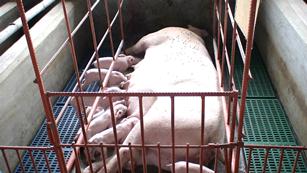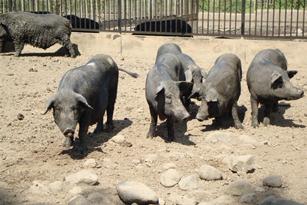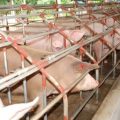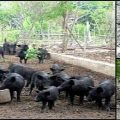Swine production in the Philippines is a P191-billion industry and is the largest among the livestock and poultry industries of the country. It ranks next to rice with 18.28% contribution to the total value of agricultural production. Swine production plays a major role in ensuring the country’s food security by providing about 60% of the total animal meat consumption of Filipinos. The Philippine swine industry is ranked eighth in the world in terms of the volume of pork production and number of breeding sows. However, majority or about 65% of the pigs in the Philippines are kept by smallhold pig raisers.

Despite being dynamic and technologically advanced, the local pig industry is still confronted with inefficiency of production due to low sow productivity, high mortality due to inefficient diagnostic tool, and lack of native pig genetic resource conservation, improvement and utilization initiative. Thus, the Philippine Council for Agriculture, Aquatic and Natural Resources Research and Development of the Department of Science and Technology (DOST-PCAARRD) supported research and development (R&D) initiatives through the Industry Strategic science and technology (S&T) Program (ISP) for Swine. The program aims to address the current problems by developing technologies and systems that are expected to improve the productivity and production efficiency. Through these initiatives, the program seeks to create new opportunities and increase the overall competitiveness of the Philippine swine industry.
Swine ISP accomplishments
To increase sow productivity, the Philippine Carabao Center (PCC) and Bureau of Animal Industry (BAI) in partnership with the Accredited Swine Breeders Association of the Philippines (ASBAP) develop the application of gene markers in breeding and selection of breeder pigs. This activity has optimized ten gene marker protocols associated to high litter size, fast growth rate and meat qualities as well as seven markers for screening of genetic defects and disease resistance. The adoption of the gene marker technology by the swine breeder farms is expected to increase productivity and efficiency in terms of number of pigs weaned and liveweight produced per sow per year.
To address the problem on high mortality due to diseases, researchers from the Central Luzon State University (CLSU) developed six LAMP protocols for common swine respiratory and gastrointestinal pathogens causing diseases (i.e. Pasteurella multocida, Haemophilus parasuis, Actinobacillus pleuropneumoniae, Cryptosporidium sp., Salmonella sp., and Porcine Epidemic Diarrhea (PED) Virus. CLSU has forged memoranda of agreement with three Regional Animal Disease Diagnostic Laboratories (RADDLs) of the Department of Agriculture institutionalizing the LAMP assays to be part of their routine diagnostic protocol. In addition, a pilot laboratory was established for the production of PED RT-LAMP test kits at CLSU. Patent for the PED RT-LAMP test kit was applied, while trademarks for the logo and tagline were registered at Intellectual Property Office of the Philippines (IPOPHIL).
The native pig breed is expected to provide sustainable livelihood opportunities for rural farming communities. (Photo from the Livestock Research Division, DOST-PCAARRD)
Related to improving farm productivity through better farm management and decision making, a Web-based Group Monitoring System for pigs was established. Cooperating commercial piggery farm is currently testing the system. The data/image transmitted can be viewed real-time using the desktop computer in the farm’s office. In addition, a smartphone application was developed that can estimate body weight of pigs using captured images.
In response to our need to implement a pork traceability system from pen to plate, a computer software system was developed for tracking animals inside the farm and from the farm to the slaughterhouse gate using RFID (radio frequency identification). Moreover, to detect the presence of other meat aside from pork in a product, a DNA-based species authentication technology (PCR- Polymerase Chain Reaction) was developed. It can detect meat from pig, cattle, goat and horse.
For the development of native pig breeds in the Philippines, initial breeding population was established and criteria for selecting of breeder native pig were developed. On the other hand, native pig free-range management protocol is being developed. The forage or pasture area were established and being maintained to provide the feed of the native pigs. The development and improvement of Philippine native pig breed is expected to provide sustainable livelihood opportunities for rural farming communities.
Related to utilization of native pig, the processing techniques for Etag were established following food safety requirements and quality control protocols. Etag is an ethnic and traditional meat delicacy of the Cordilleras processed through curing of pork (from native pig) with salt prior to sundrying or smoking for preservation. Etag is used as flavor enhancer in different viands. Etag processed using the standardized techniques comply with the food safety standard for microbial count of E. coli, Staphylococcus areus and absence of Salmonella. Moreover, convenient type Etag-based products such as cubes, powder and granules and liquid seasoning were developed. Etag processing facility was established at the Benguet State University (BSU).
DOST-PCAARRD will showcase the swine ISP including other agri-aqua S&T research and development (R&D) outputs on March 2-4, 2016 during the SIPAG FIESTA at its headquarters in Los Baños, Laguna.
SIPAG, a technology transfer strategy, embodies the Council’s commitment to DOST’s Outcome One in a bid to ensure that the fruits of R&D activities for the agri-aqua sectors will be a blessing for every Juan.
by Livestock Research Division, DOST-PCAARRD S&T Media Service






